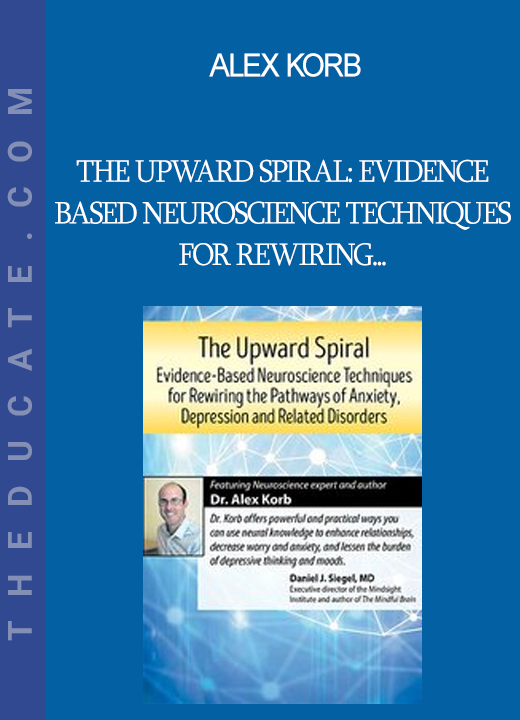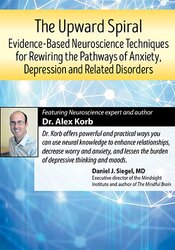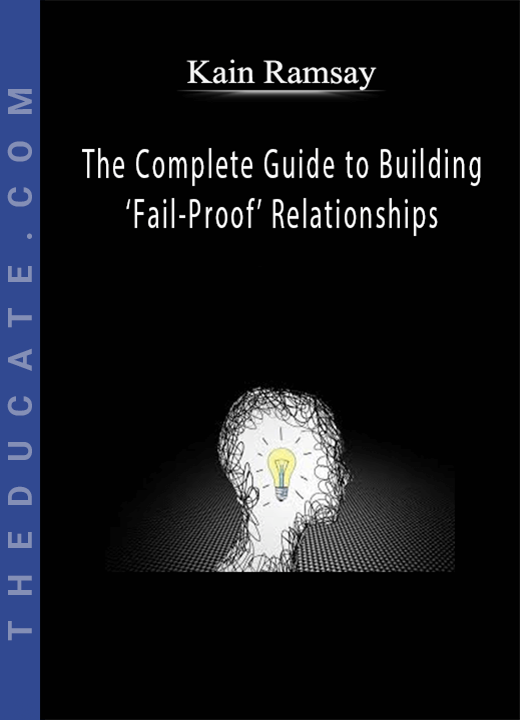Description
Alex Korb – The Upward Spiral: Evidence-Based Neuroscience Techniques for Rewiring the Pathways of Anxiety, Depression and Related Disorders
- Faculty:
- Alex Korb
- Duration:
- 6 Hours 52 Minutes
- Format:
- Audio and Video
- Copyright:
- Jan 26, 2021
Description
Early in my career, I recognized a disconnect between neuroscience research and popular treatment strategies. While depression and anxiety are clearly rooted in altered brain function, most clinicians were not taught about specific neural circuits and neurotransmitters that contribute to these disorders. As a result, treating mood and anxiety disorders were often incomplete – many solutions uncovered by research were overlooked and strategies relied heavily on medication without any changes in a client’s action, activity and environment. There had to be a better way to treat these clients and improve outcomes!
Today, I know that using proven cognitive-behavioral interventions like Acceptance and Commitment Therapy (ACT), Mindfulness-Based Cognitive Therapy (MBCT), and Behavioral Activation Therapy (BAT) in conjunction with exercise, social support and positive habits yields powerful therapeutic effects. Expanding your tool kit of brain-based interventions allows you to accommodate your clients’ different challenges. And, when your clients understand that what feels “wrong” is actually the activity and chemistry of particular brain circuits, it improves treatment buy in and compliance.
Watch this must attend conference and I will show you how to put the power of neuroscience to work for you and your clients:
- Utilize brain-based cognitive therapies like ACT, MBCT, and BAT for mood and anxiety disorders
- Apply new techniques informed by the latest neuroscience research to improve treatment outcomes
- Discover how simple interventions modulate the activity and chemistry of key brain regions
- Learn how to teach clients about their brain
Are you ready to expand your treatment tool box with the latest in neuroscience techniques?
Let me help you take your practice to the next level. Your satisfaction is guaranteed. Purchase today!
See you there,
Dr. Alex Korb
Handouts
| Manual – The Upward Spiral (8.4 MB) | 80 Pages | Available after Purchase |
Outline
Understand the Key Brain Regions and Chemicals Involved
- Prefrontal cortex, limbic system, striatum
- Neurotransmitters: serotonin, dopamine, norepinephrine, oxytocin, etc.
- How it all fits together
Key Principles From Proven Cognitive-Behavioral Interventions
- Behavioral Activation Therapy (BAT)
- Acceptance and Commitment Therapy (ACT)
- Mindfulness-Based Cognitive Therapy (MBCT)
Utilize the Benefits of Exercise
- Benefits on serotonin and dopamine systems, as well as stress reductions
- Intensity and frequency of exercise required
- How simply being outdoors can help
Minding the Amygdala: Mindful Awareness of Emotions
- Labeling feelings to reduce amygdala activity
- Making the most of ACT to reduce stress
Set Goals, Make Decisions, and Top-Down Regulation of Brain Activity
- The impact of goal-setting on lower-level processing
- Choice, decisions and happiness
- The importance of intention and voluntary choices
- Simple strategies for applying BAT
Low-Tech Biofeedback
- The mind-body connection, meditation and MBCT
- Understanding heart-rate variability
- The power of breathing
- How postural changes, muscle tension and facial expressions can affect mood
How the Brain Encodes Habits and How to Change Them
- The distinction between impulses and routines
- Cognitive and emotional habits
- The relationship between habits and stress
- Cognitive-behavioral approaches to changing habits
Social Solutions
- The impact of social support on the brain’s stress response
- The power of physical touch
- Why social interactions are rewarding
- How social support can improve the efficacy of medication
The Power of Gratitude
- The impact of gratitude on key neural circuits
- How to operationalize gratitude in order to implement it in daily life
Make the Most of Sleep
- How sleep affects mood
- Key changes in sleep hygiene that improve sleep quality
The Limitations of Neuroscientific Research
- fMRI imaging
- Things to consider regarding animal studies
- Simple explanations for complicated processes
Faculty

Alex Korb, Ph.D. Related seminars and products: 4
Alex Korb, Ph.D., is a neuroscientist, writer and coach. He has studied the brain for over 15 years and is the author of The Upward Spiral: Using Neuroscience to Reverse the Course of Depression, One Small Change at a Time. He received a BS in Neuroscience at Brown University, before earning a PhD in Neuroscience at UCLA. His dissertation focused on measuring electrical activity in the brain to better understand and treat depression. He is an adjunct assistant professor in the department of psychiatry at UCLA where his research focuses on neuroimaging and the development of a novel brain stimulation device. He has authored over a dozen peer-reviewed journal articles on the neuroscience of psychiatric disorders.
His popular blog on PsychologyToday.com has over a million views. He speaks around the country on neuroscience and has appeared on radio shows and podcasts worldwide. He has a wealth of experience in yoga and mindfulness, physical fitness, and even stand-up comedy.
Speaker Disclosures:
Financial: Alexander Korb is an adjunct assistant professor at UCLA. He receives a speaking honorarium from PESI, Inc.
Non-financial: Alexander Korb has no relevant non-financial relationship to disclose.







Reviews
There are no reviews yet.